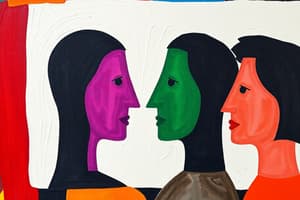Podcast
Questions and Answers
What is a possible underlying reason for people's prejudiced behavior?
What is a possible underlying reason for people's prejudiced behavior?
- Influence of family and friends
- Fear of the unknown (correct)
- Lack of education
- Biological instincts
Which theory could be used to explain how people form and change their prejudiced attitudes and behaviors?
Which theory could be used to explain how people form and change their prejudiced attitudes and behaviors?
- Realistic Conflict Theory
- Theory of Planned Behavior (correct)
- Contact Hypothesis
- Social Identity Theory
What is a type of prejudice that is often intersectional with racism?
What is a type of prejudice that is often intersectional with racism?
- Classism
- Ageism
- Sexism (correct)
- Homophobia
Which of the following is a type of prejudice that is based on social class?
Which of the following is a type of prejudice that is based on social class?
Why are people prejudiced towards certain groups?
Why are people prejudiced towards certain groups?
What is the Benjamin Franklin Effect related to?
What is the Benjamin Franklin Effect related to?
What is a possible outcome when someone does a favor for another person?
What is a possible outcome when someone does a favor for another person?
Why might someone's attitude towards another person change after doing a favor for them?
Why might someone's attitude towards another person change after doing a favor for them?
What type of attitude change is most related to the Benjamin Franklin Effect?
What type of attitude change is most related to the Benjamin Franklin Effect?
In what way might cultural influences affect the Benjamin Franklin Effect?
In what way might cultural influences affect the Benjamin Franklin Effect?
What is the primary reason why someone might do a favor for another person?
What is the primary reason why someone might do a favor for another person?
How might the Benjamin Franklin Effect be related to role model identification?
How might the Benjamin Franklin Effect be related to role model identification?
What is a possible outcome of punishing someone for not doing a favor?
What is a possible outcome of punishing someone for not doing a favor?
In what way might social experiences influence the Benjamin Franklin Effect?
In what way might social experiences influence the Benjamin Franklin Effect?
Flashcards are hidden until you start studying
Study Notes
Prejudice and Its Consequences
- Prejudice can be directed towards a particular race or gender, such as Asians or Africans, among others
- Prejudice can lead to negative consequences, including:
- Lowered self-esteem
- Distress
- Even murder
The Persistence of Discrimination
- Despite noticeable reductions in discrimination over the past 50 years, it still exists
- Discrimination can take subtle and sometimes not-so-subtle forms
The Question of Prejudice
- An important question to consider is why people hold prejudiced views
Cultural Influences
- Culture refers to the total of knowledge, beliefs, values, and customs that people use to adapt to their environment.
- People's self-definitions vary across different cultures.
- Culture includes both tangible and intangible elements.
- Organizations should strive to create a positive corporate culture.
Origins of Attitudes
- Social experiences shape attitudes.
- Affectively based attitudes are based on people's feelings towards an attitude object, rather than their beliefs.
- Sources of affectively based attitudes include:
- Values
- Mere exposure
- Classical conditioning
Components of an Attitude
- An attitude consists of three components:
- Cognitive: what a person believes about the source of the attitude.
- Affective: how a person feels about the source of the attitude.
- Not mentioned in the text (implying a third component, often referred to as the conative component, which involves a person's intentions or behaviors)
The Benjamin Franklin Effect
- Doing a favor for someone can increase one's liking for the person for whom the favor was done.
Why Behavior Affects Attitudes
- Not mentioned in the text (the section is incomplete)
Studying That Suits You
Use AI to generate personalized quizzes and flashcards to suit your learning preferences.



